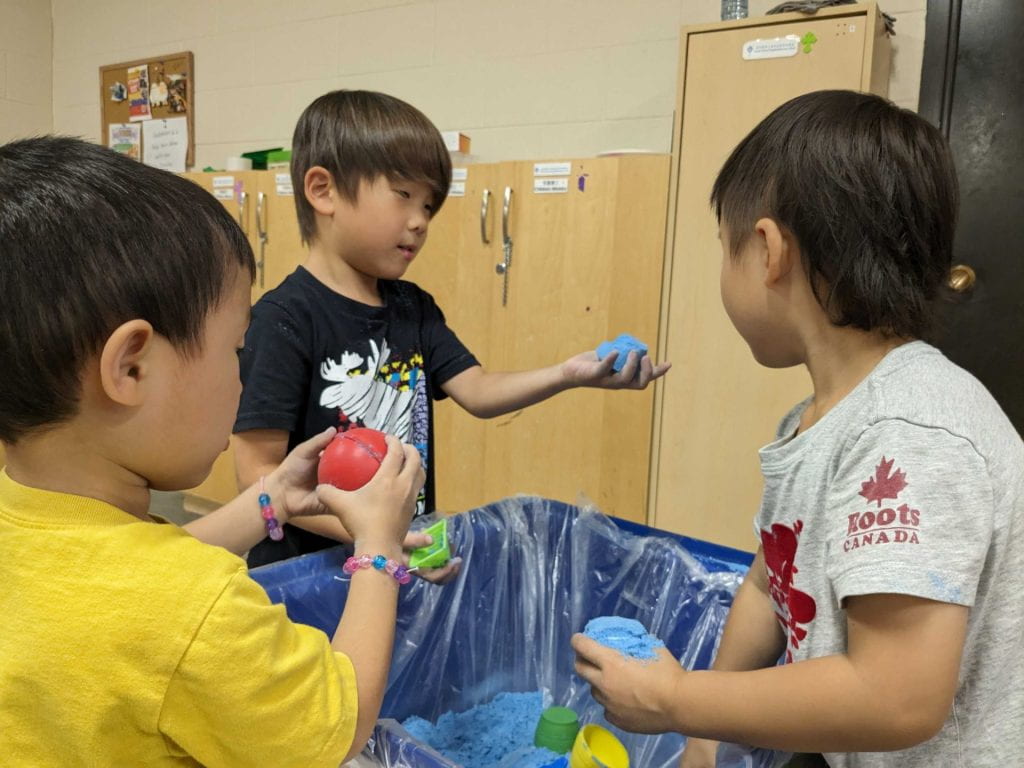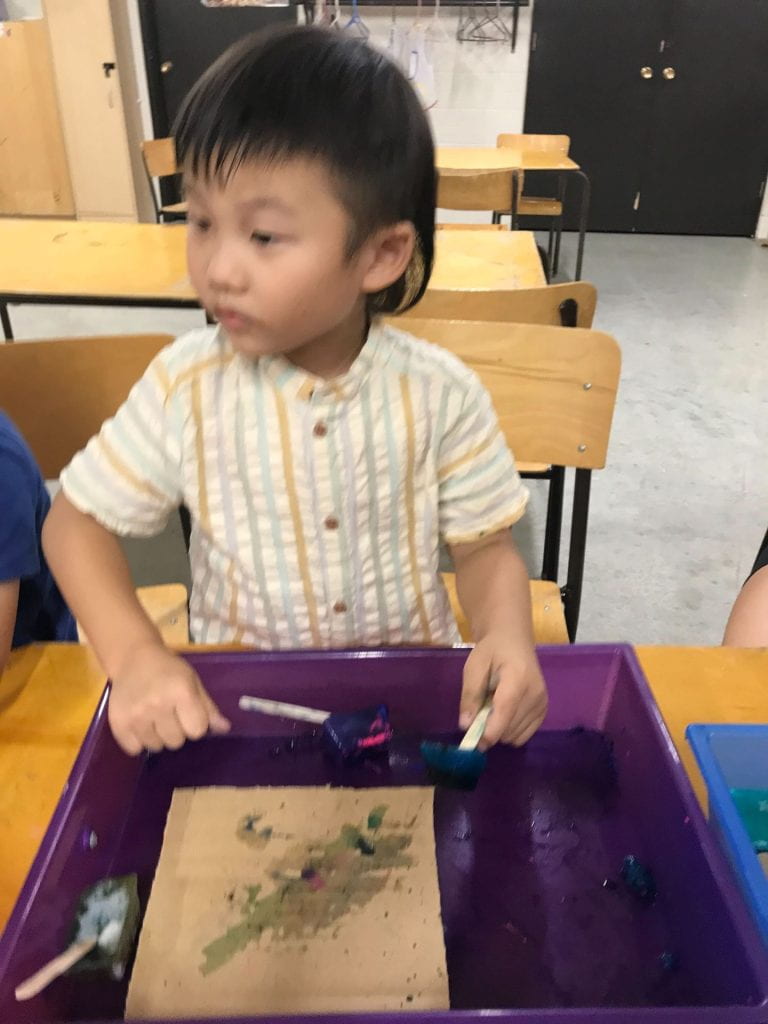- For our ECE Program – we will be providing lessons to our campers under the theme of STEAM (Science, Technology, Engineer, Arts, Math) as well as focusing on Sports & Physical Activities
- All lessons will be following under learning objectives aligned with ELECT (Early Learning for Every Child Today). I have attached the document for your reference (Please refer to pg. 47-64)
- Main focus of development are: Physical, Emotional, Social, Cognition, Communication & Literacy
- The focus for the ECE Program is “Play to Learn” and through the 8 weeks, we hope to help our campers to discover their interests (what they like and don’t like), develop their character (attitude and self-esteem), and to design their thoughts and ideas visually and practically through our themed lessons under STEAM & Sports.
- Our theme this year is Time Travel. We will be focusing on using a historical lens to approach lessons and activities in STEAM and Sports. Campers will get a chance to develop visual and practical connections to key historical moments in the past and follow the advancements that lead to the present. Look forward to the Journey through the ages!
PHOTOS AND VIDEOS
Week 8: 1900 CE. – PRESENT
The Modern Era consists of scientific breakthroughs, new technologies, increasing levels of integration, and changing relationships between humans and the environment. As campers reflect on the past weeks and how the difference starts in art, science, and technology have ultimately shaped the current world that we are living in. Exploration and thought is encouraged on how different innovations and inventions will continue to develop into the future!
August 21st – 25th.






Engineering: Thinking of the Future.





Physical Activity: Exploring the Dark with Flashlights.






Engineering: The Floor is Lava Safe Spots.
Week 7: 1750 CE. – 1900 CE.
The Early Modern Era is dominated by new-found eonomical and political success. Mainly the gradual process of the Industrial Revolution fundamentally changed how goods were produced. T Vast new resources of energy stored in fossil fuels greatly increased the energy available to human society. New patterns of global trade and production further integrated the global economy as new markets and raw materials emerged. he development of light bulbs, telephones, and airplanes is looked at and compared to what they are today!
August 14th – 18th.





Math: Patterns and Bracelets.












Physical Activity: Balloon Tennis.





Exploration: Sand Table Play.


Science: Making Cars.






Art: Taking Photos for Scrapbooking and Adventuring.







Engineering: Making Pillow Forts and the Floor is Lava Safe Spots.









Engineering: Learning about Building Circuits.












Exploration: Ice-cube Painting.













Engineering: Making Paper Airplanes.
Week 6: 1600 CE. – 1750 CE.
The Scientific Revolution begins in this period with many profound changes in different realms of human endeavor. Science as a formalized practice, technological progress, and civic politics, capitalist economies in conjunction to the decline of feudalism. With this echoing the “rebirth” of art and culture, there is great knowledge and understanding about the world through discovery found within the earliest phases of globalization
August 7th – 11th.












Engineering: Making Parachute Bases.











Math: Counting and Sorting Practice.















Physical Activity: Hide and Seek in the Dark with Flashlights.








Exploration: Color Mixing.


Language: Story Time.












Engineering: Parachute Testing.








Exploration: Designing a Club House.


Physical Activity: Flashlight Tag and Tag.




Science: X-Ray Learning.
Week 5: 1450 CE. – 1600 CE.
The beginning of the European Renaissance marks the start of the Early Modern Era. The major rebirth in art, literature, society, and other aspects of culture that was lost after the fall of the Roman Empire is reflected in the advancements and inventions in this time period. One of the unique features of this period is the spreading of globalizing character with new economies and institutions and development of experimental science. Campers get creative and learn about the inventions of this time.
July 31st – August 4th










Exploration: Making Fake Snowstorms.





Art: Learning About Concentric Circles with Beads and Contact Paper.









Physical Activity: Soccer and Dodgeball.






Art: Beads!







Science: Tinfoil Boats.










Art: Designing Artist Inspired Bookmarks.





Science: Rainbow Skittles, Color Wheel.





Exploration: Making Balloon Stress Balls.










Art: Glow in the Dark Fun and Adventure.





Science: DIY Clay.






Engineering: Building Cardboard Castles!



Language: Reading.







Baking: Lemon Cupcakes.















Science: Making Fish Bottles.
Week 4: 1250 CE. – 1450 CE.
The Late Middle Ages marked the end of prosperity and growth in Europe. Knights and castles seen in classic medieval themes will be presented. This time period saw the a reduction in population due to the Great Famine and the Black Death. Basics of how disease can be transferred are explored. There was also great progress seen in the arts and sciences as interested was renewed in Greek and Roman literature. The end of the Middle Ages begins with the Age of Discovery and early modern Europe.
July 24th – 28th





Math: Writing Numbers.






Science: Making Soup.





Art: Making Crowns.




Science: Making Rockets.






Exploration: Painting with Balloons and Water Paint.






Exploration: Acrylic Pouring.







Exploration: Making Color Slime.



Math: Spelling Numbers.



Art: Tissue Paper Mosaics.















Physical Activity: Ball Throwing and Collecting Tag.



Baking: ECE and Secondary Campers Making Cookie Cups.
Week 3: 476 CE. – 1250 CE.
The fall of the Roman empire marks the beginning of the Middle Ages. A huge loss in previous developments give the campers an opportunity to explore “lost knowledge” and learn about changes in society and political structures. The High Middle Ages saw an increase in technological and agricultural innovations leading to more trade. Near the end of this time period, a formal division is seen between the Catholic and Orthodox churches and the military attempts of the crusades. Campers will get the opportunity to find see the various unique elements of this time period.
July 17th – 21st.




Exploration: Chocolate Banana Creation.





Physical Activity: Music and Dancing.













Science: Light and Bubbles.




Math: Shopping with Coins.







Art: Painting Shields.















Engineering: Boat Making, Testing, and Water Play.



Language: Reading Time.




Exploration: Making Play Dough.







Art: Fingerprinting and Painting.
Science: Balloon Jets and Balloon Popping.




Physical Activity: Climbing.







Baking: Making Baked Goods with Secondary Campers.





Exploration and Camp Activities.
Week 2: 600 BCE. – 476 CE.
The Classical Era comprised of interlocking civilizations of ancient Greece and ancient Rome. We see the establishment of early foundations in democracy, philosophy, mathematics, drama and poetry. Later on, ancient Rome further developed legal systems, irrigation systems, architecture, city roads, and the growth of Christianity. The impacts of these ancient civilizations on technology, arts, and culture is explored.
July 10th -14th.


Exploration: Going Over the Rules.








Exploration: Fun with Bubbles!






Math: Shape Tracing and Cutting.









Math: Money Counting and Sorting.






Science: Wheels and Ramps.


Language: Reading Time.






Exploration: Checking on the Sprouts and Fun with Chalk.





Art: Making Sculptures.




Engineering: Building Roads and Exploration.




Art: Paper Mosaics, Leaf Design.







Physical Activity: Fun with Balls.

Language: More Reading!







Exploration: Plants and Housecleaning Pretend Play.





Art: Cutting Numbers.



Science: Making Cannons.






Language: Reading Time!








Exploration: Melting Ice Block.









Science: Pool Noodle Launcher.





Baking. Working Together and Stirring with the Secondary Campers!
Week 1: 1000 BCE. – 600 BCE.
Heading back in time to the ancient civilizations! Consider what life looked like for people and how lifestyle was centered around hunting and gathering. Emphasis is placed on the shift towards an agricultural-centric lifestyle depending on where early civilizations settled down. Activities include learning about the basics of seed planting, different tools used during the times, and opportunities to experience what daily life was like through play.
July 4th – 7th.





Language: Reading and Recall time.






Art: Designing and Ancient Buildings.



Exploration: Seeds! Intro to Planting.



Engineering: Ancient Buildings and Building Bridges.


Math: Shape Hunting.





Exploration: Magnifying Glass.




